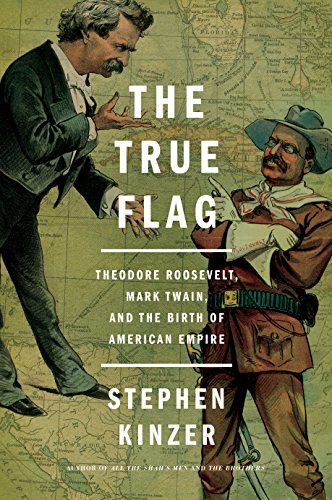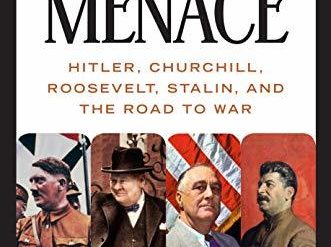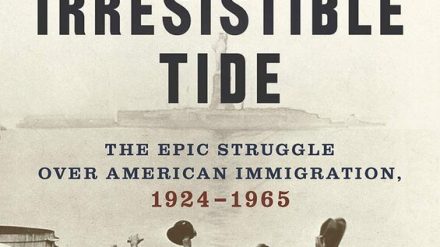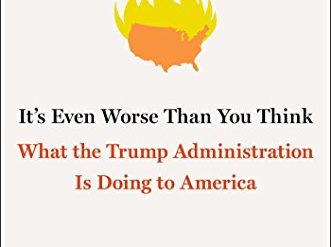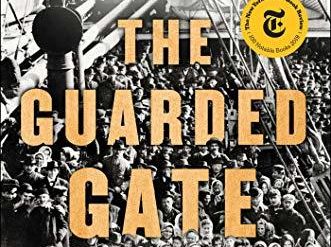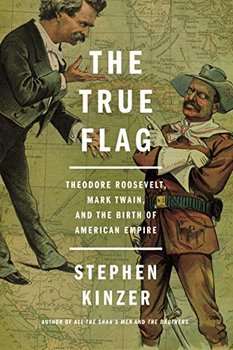
In The True Flag: Theodore Roosevelt, Mark Twain, and the Birth of the American Empire, award-winning journalist and author Stephen Kinzer recalls the four-year period 1898-1902, when the United States made its debut as a world power. The central event in this story was the U.S. seizure of Cuba, Guam, Puerto Rico, and the Philippines and the annexation of Hawaii, all in 1898.
The central question in U.S. foreign policy
Drawing on the newspapers and magazines of the times and on historical archives, Kinzer recalls the debates surrounding these events in colorful detail. His stated aim is to examine the central question of U.S. foreign policy: “Should we defend our freedom, or turn inward and ignore growing threats? Put differently: Should we charge violently into faraway lands, or allow others to work out their own destinies?” Kinzer’s thesis is that American entry into war with Spain in 1898 marked the crucial turning point in this debate. That brief, inglorious conflict represented the advent of the U.S. as a world power.
Mark Twain vs. Teddy Roosevelt?
To bring focus to his story, the author casts a spotlight on the debate between President Theodore Roosevelt and Mark Twain. The book’s subtitle frames this picture. As Kinzer writes, the two were “deliciously matched. Their views on life, freedom, duty, and the nature of human happiness could not have been further apart . . . Roosevelt considered colonialism a form of ‘Christian charity.’ Twain pictured Christendom as ‘a majestic matron in flowing robes drenched with blood.’” Unfortunately, the emphasis on these two men is misleading. Others played much larger roles in the crucial years of 1898-1900 than Twain did. He came into the picture later, as Kinzer himself clearly explains.
The True Flag: Theodore Roosevelt, Mark Twain, and the Birth of the American Empire by Stephen Kinzer (2017) 320 pages ★★★★★
The two sides of the debate
Kinzer draws our attention to the principal figures in the two factions that lined up before the Spanish-American War. What might be termed the imperialist faction was led by Senator Henry Cabot Lodge, then New York Governor Theodore Roosevelt, and publisher William Randolph Hearst. These three men were largely responsible for pushing the United States into war with Spain. Former U.S. Senator and Union Army general Carl Schurz, William Jennings Bryan, former President Grover Cleveland, and later Andrew Carnegie led the opposition. Mark Twain came to the debate belatedly, becoming the most recognizable voice of the anti-imperialist movement once Roosevelt was in the White House.
Kinzer depicts Teddy Roosevelt as bloodthirsty and racist to the core. In the 1890s, “Roosevelt racked his brain to find a possible enemy. ‘I should welcome almost any war, for I think this country needs one.’ he wrote in 1895.” Henry Cabot Lodge and William Randolph Hearst gave him the war he craved, Lodge from his seat in the U.S. Senate and Hearst by manipulating public opinion through his influential newspaper chain.
As Kinzer makes clear, Lodge was the driving force in Roosevelt’s career. It was he who persuaded President McKinley to name the young New Yorker assistant secretary of the Navy, then gained him the nomination as Governor of New York, and later maneuvered him into the Vice Presidency. From there, of course, Roosevelt succeeded to the Presidency upon McKinley’s assassination in 1901. Lodge viewed Roosevelt as his agent to lead the nation onto the world stage. The two men were in touch on a daily basis throughout these crucial years.
The Anti-Imperialist League
Superficial histories of the years just before and after the turn of the 20th century give the impression that America’s drive to war with Spain and the seizure of its overseas colonies was irresistible and inevitable. Undoubtedly, “[t]his was the most popular war in American history . . . Americans had their first taste of overseas conquest, and they loved it.” But the sentiment was hardly universal. An Anti-Imperialist League spread nationwide from its base in New England, led by Carl Schurz, William Jennings Bryan, and Grover Cleveland. As Kinzer shows, the force these men represented was powerful.
Debate erupted nationwide and greatly intensified as the U.S. grabbed the Philippines and went to war with its independence movement. In the U.S. Senate, the treaty to approve the acquisition of the Philippines was debated furiously for months and was only approved by the narrowest of margins—and then only because William Jennings Bryan changed sides at the last minute, swaying several Senators to switch and robbing the opponents of the treaty of a likely victory.
When did the U.S. become an imperialist nation?
Most Americans date the beginning of what has come to be called the American empire to the Spanish-American War of 1898, as Kinzer does in his book. At any rate, that’s the story we’re taught as children. Truth to tell, however, the United States has been an imperialist nation (in the contemporary sense of the term) since the origins of our republic. Thomas Jefferson famously purchased the Louisiana Territory in 1803, doubling the size of the young nation. Then-General Andrew Jackson ousted the Spanish from Florida in 1818. James K. Polk led the U.S. into war with Mexico in 1846, adding an additional one-third to our territory and extending our reach to the Pacific Ocean. And none of this acknowledges our country’s genocidal wars against the Native American peoples who had lived on this land for at least 12,000 years before Europeans arrived.
If these actions don’t constitute imperialism, the term means little. From time to time Kinzer quotes individuals who acknowledged this during those crucial years, so he doesn’t entirely overlook this history. But he fails to emphasize what surely is the most significant evidence that the foreign policy debate he writes about did not emerge whole in 1898.
For related reading
I’ve reviewed two other good books on related subjects:
- How to Hide an Empire: A History of the Greater United States by Daniel Immerwahr (A supremely entertaining history of American empire)
- The Imperial Cruise: A Secret History of Empire and War by James Bradley (Teddy Roosevelt and the dark side of American foreign policy)
This is one of the books I’ve included in my post, Gaining a global perspective on the world around us.
You might also enjoy:
- 13 good recent books about American foreign policy
- Top 10 nonfiction books about politics
- 20 top nonfiction books about history
- Top 20 popular books for understanding American history
And you can always find my most popular reviews, and the most recent ones, on the Home Page.

